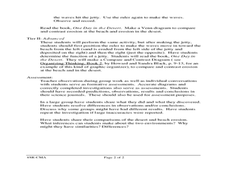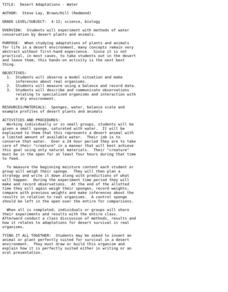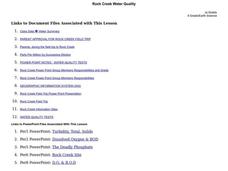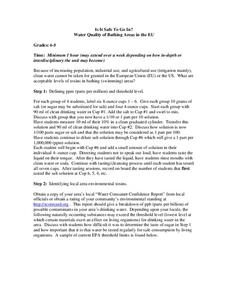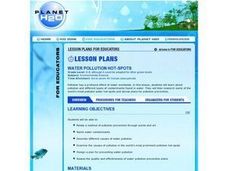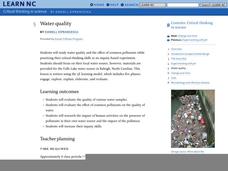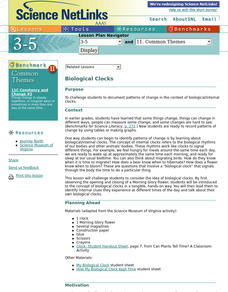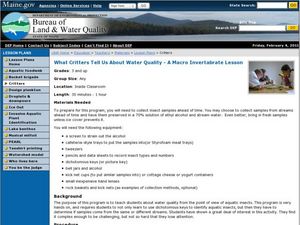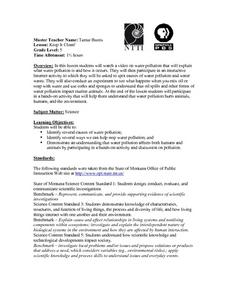Curated OER
The Physical Environment
Fourth graders use damp sand, a baking pan, and water to simulate erosion. In this erosion lesson plan, 4th graders participate in a simulation to show what moving water does to land.
Curated OER
Are You Balanced With Your Environment?
Students discuss the impact of not keeping the environment in balance for future generations. As a class, they are introduced to the concept of "Balance of Nature" and what it means. In groups, they research the role of trees and how to...
Curated OER
Desert Adaptations: Water
Students experiment with methods of water conservation. For this water conservation lesson, students explore the importance of water for plants and animals in a desert biome.
Curated OER
The Living Environment
Learners explore the cycles of an ecosystem. In this environmental science lesson plan, students work in groups to research the nitrogen cycle, the water cycle, or the oxygen-carbon dioxide cycle. Learners prepare a PowerPoint or...
Curated OER
Water and Ice
Students observe what happens to water as it goes from a solid to a liquid. In this exploratory lesson plan students gain an understanding for the water cycle while working in groups observing what happens to water as it changes...
Curated OER
Rock Creek Water Quality
Ninth graders test water in a local creek using chemical kits and probes. They take GPS readings and digital photographs. They calculate the Water Quality Index and create a spreadsheet.
Curated OER
Water - Planning for the Future
Students explore and examine the increases and/or decreases for water user groups: irrigation, municipal, manufacturing, steam electric power generation cooling, livestock, and mining. They utilize percentage changes during their...
Curated OER
Are You Thirsty? The Effects of Pollution on Drinking Water
Discuss the availability of clean, plentiful water and the causes of water pollution. In groups, sixth graders discuss problem-solving methods for keeping water clean. They explore the function of water treatment plants and perform...
Curated OER
Is It Safe To Go In? Water Quality of Bathing Areas in the EU
Students complete an experiment on water to study water quality. In this water quality lesson, students complete a taste test experiment about chemicals in water. Students then study their local water environments and recorded toxins....
Curated OER
Water
Young scholars create a water filter according to given criteria. I this chemistry lesson, students evaluate the importance of water in their lives. They develop a book or brochure on the water treatment process.
Curated OER
Clean Water vs. Dirty Water
Students study the importance of clean water to the survival of organisms and what activiities and material pollute water. They measure the temperature of water samples and create a class graph.
Curated OER
Water Pollution Hot-Spots
Pupils complete internet research in small groups to identify types of water pollution, spotlight water pollution hot-spots, and design a plan for water prevention.
Curated OER
Water Quality
Students analyze water quality and turbidity of collected samples. In this physics lesson plan, students conduct tests to identify the suspended particles in the samples. They explain how human activities affect water quality.
Curated OER
Major American Water Routes
Sixth graders locate and identify the major bodies of water and waterways in the United States. Through a simulation activity, they describe how early explorers would have described their surroundings. Working in groups, they create...
Curated OER
Understanding the Effects of Water Pollution
Third graders examine the effects of water pollution by participating in a story. After reading the story, they determine the best way to get rid of the pollution in a river using different objects. In groups, they complete a worksheet...
Curated OER
Water 1: Water and Ice
Students investigate water in its solid and liquid form. In this states of matter instructional activity, students experiment to see what happens as water goes from a solid, ice, to a liquid, water, and back again. They write about and...
Curated OER
What Critters Tell Us About Water Quality: A Macroinvertebrate Lesson
Students explore our ecosystem by investigating the quality of our water. In this aquatic insect activity, students examine a group of random insects collected from different streams and ponds in the area. Students record their...
Curated OER
Environment: The River Classroom
Seventh graders engage in hands-on experiments and activities dealing with rivers and greenways. They also observe lectures and demonstrations by experts in water and river restoration. Students and teachers participate in canoe trips...
Curated OER
Keep It Clean!
Fifth graders investigate the how water becomes polluted and how it effects the environment, animals, and humans. They watch a video and conduct experiments.
Curated OER
Week 8 - Sea Life
Using a magnifier, mini marine biologists examine the barbules of a bird feather. They swirl the it into a mixture of oil and water and then re-examine the feather. After the activity, discuss how the oily feathers pose a problem to...
Curated OER
Watershed Protection
Young scholars explore environmental care by participating in an Earth science activity. In this clean water lesson, students discuss what a watershed is, how they become polluted, and how it affects the overall quality of drinking...
Curated OER
Galileo's Thermometer: Measuring the Density of Various Unknown Liquids
Sprouting scientists explore the concept of density by making mass and volume measurements for five different liquids. From these measurements, they calculate densities. They apply their learning to explain Galileo's thermometer works...
Curated OER
Fresh Water and land of Kiribati and Hawaii (Molokai)
Fourth graders examine the islands of Hawaii. Using this information, they organize it and create a map or graph that represents the data. As a class, they discuss how the watersheds on the islands are different and how people react to...
Curated OER
Week 3: Pollution Source and Effects
Lab groups set up an experiment to observe what happens over time in collected pond water when fertilizer, representing pollution, is added. This website does not include student lab sheets, but background information, materials, and...
